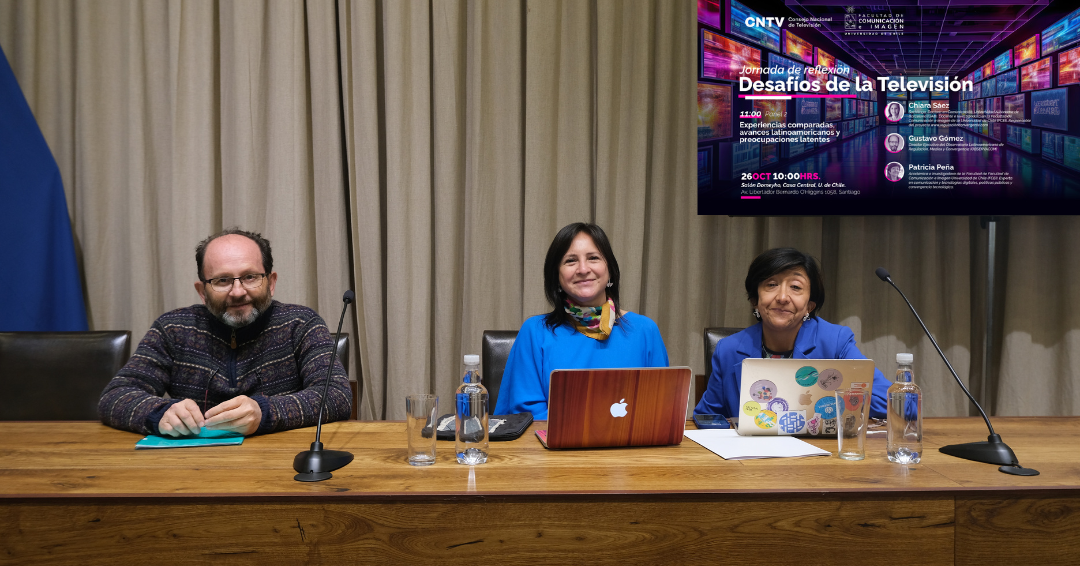Researchers Chiara Sáez and Patricia Peña spoke about the impact of technomedia convergence and regulation in national media, comparative experiences and the importance of a multidisciplinary approach in formulated public policies.
The seminar was attended by the dean of the Faculty of Communication and Image, professor Loreto Rebolledo, and it was held at the Domeyko Hall of the Universidad de Chile Central House. It was organized by the National Television Council (CNTV) and the Faculty of Communication and Image (FCEI) of Universidad de Chile.
To Dean Rebolledo, “media analysis and freedom of expression have been a hallmark in our faculty and a central focus in our work as a public university concerned with the promotion of citizen rights. We think it is the duty of academics and experts to influence the generation of a public debate on communication issues that interest the country, as well as contribute to the formulation of communication public policies.”
In turn, the president of the National Television Council, Mauricio Muñoz, remarked: “Is it necessary to strengthen the competences of the National Television Council? It is an open question, a challenge for government and legislative institutions, yet one that is on our minds. On one hand, for television, which receives the burden of oversight, and on the other, for streaming and all the competing platforms, which are sometimes complemented by television but are not subject to oversight.”
In three discussion panels, the academics and experts addressed the complexities of regulation in times of technomedia convergence, analyzed regulatory experiences in the region, their progress and persisting challenges, as well as the role played by fiction television series in the Chilean collective imaginary.
Sáez and Peña led the second roundtable along with Gustavo Gómez, executive director of the Latin American Observatory of Regulation, Media and Convergence (Observacom), where they discussed “comparative experiences, Latin American advances and latent concerns” surrounding a regulatory institutionalism, their inherent asymmetries and regulatory scopes in different areas of communications.
“We have to think that there are three dimensions in play: broadcasting, including radio and TV, telecommunications, and Internet. That is the existing convergence. The question is how the institutionalism addresses this and in which way. We are open to thinking about whether it should be one or more institutions, whether state regulation is enough or not. It is an open question to us,” stated Sáez, lead researcher of the Fondecyt project on #RegulaciónConvergente.
Peña stressed that there are currently “eleven bills that specifically address fake news: they all have a very vague conceptualization. We have two bills, one that regulates digital platforms and another that regulates the services of digital platforms, whose processing has been long-delayed.”
The seminar also featured the participation of Ana Bizbergue, doctor of social sciences and researcher at Universidad de Buenos Aires and Universidad General San Martín; Joan Barata, expert in freedom of expression and media regulation; and Martín Becerra, doctor of information sciences and professor at Universidad Nacional de Quilmes and Universidad de Buenos Aires, with a panel about “Debates on regulation and regulatory challenges in times of convergence”.
The seminar’s closing was led by Lorena Antezana, doctor of communication and information and director of the FCEI research and society nucleus; María Constanza Mujica, doctor of literature and professor of semiology and cultural studies at Universidad Católica de Chile; and Paula Aliste, journalist and head of outreach at the National Television Council, in a roundtable moderated by FCEI professor Eduardo Santa Cruz in which the policy paper “Fiction television series about the past and the audiovisual production ecosystem: the Chilean case” was presented.


